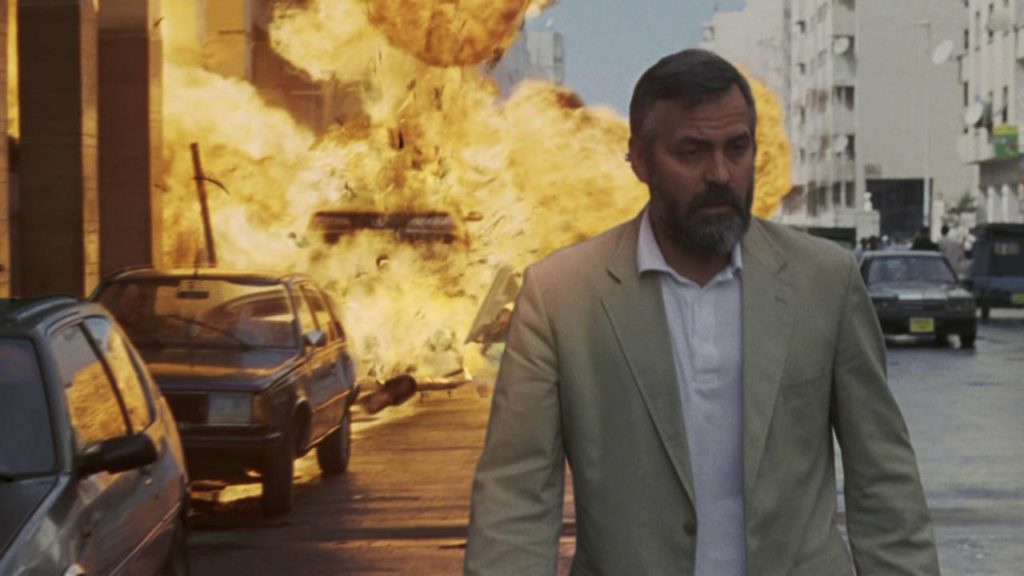Syriana Review

“The Beverly Hillbillies” called oil “black gold,” which sums things up quite well. It’s a commodity that people like Daniel Plainview from There Will Be Blood would sell his soul for back at the turn of the 19th century, and in the century between when that film is set and when Stephen Gaghan’s Syriana is both set and released, the politics and business of oil only became more complicated, more high-stakes, and more morally fraught.Â
Let me get one thing out of the way right now: Syriana is not the film There Will Be Blood is. Maybe half that. But for me, that still qualifies it as pretty engaging and successful. It’s Traffic for oil – not surprising when you learn that Gaghan wrote the Soderbergh film and that this is his debut as a director. The problem is that it feels that way, which is tough when There Will Be Blood and even Traffic are bursting with life in every frame.
Syriana connects multiple loosely related stories that center around oil. They take place all around the world – from Washington to the Middle East. George Clooney is the closest thing we have to an anchor. He plays a strung-out CIA agent who gets caught up in a plot to assassinate a forward-thinking prince of an unnamed Middle Eastern country’s royal family (Alexander Siddig) who favors selling rights to his country’s oil resources to a Chinese firm, rather than an American one.
Matt Damon is an energy analyst who suffers a personal tragedy and begins working for the aforementioned Prince Nasir Al-Subbai. Jeffrey Wright is a lawyer looking into the corporate merger of two enormous energy companies. There’s also a plot about a father and son in Pakistan who lose their job at an oil refinery because of the Prince’s decision to sell rights to China. They turn to fundamentalism as a result.
At the heart of both Syriana and There Will Be Blood is a certain confusion about who owns what and a lawlessness in regards to how various actors will assert their control. In There Will Be Blood, Daniel is taking advantage of a number of naive actors. He promises them health, wealth, and happiness—they simply want to go about their business and worship God.Â
The actors in Syriana have a distinct technological advantage over those in Anderson’s film, not to mention decades of increased expertise in business, drilling, and spying. That results in some messy relationships, complicated schemes, and more general intrigue in terms of the ins and outs of the plot as compared to There Will Be Blood.
But as I mentioned, it’s hard to even compare the filmmaking. There Will Be Blood finds meaning in a static shot of a landscape. Syriana is gray and rather rote. That’s by design, I think. Gaghan isn’t particularly enthusiastic about this world or its inhabitants. They’re all flawed at best – most much worse – but 13 years later, it doesn’t hold up as much more than passably interesting.
One fun aspect of rewatching Syriana in 2018 is seeing bit players who were on the precipice pop up all over the place. Viola Davis has a cup of coffee with George Clooney. Max Minghella plays his high school son who just wants to go to prom somewhere other than Islamabad. Mark Strong, who’d been in things but wasn’t as ubiquitous as he would soon become, is a terrorist who rips off George Clooney’s fingernails. And Tom McCarthy, a decade before Spotlight won Best Picture, plays one of Clooney’s higher-ups at the CIA.
Clooney won an Oscar for his troubles – and he had some genuinely serious troubles after an accident during the film’s torture scene saw him crack his spine and neck – and while it’s a solid performance that speaks well to the movie, it also feels like Hollywood was ready to start commenting politically on the state of American foreign policy in the Middle East more than anything sterling about the film or his work.Â
We’d see this bear more fruit in the coming years with things like In the Valley of Elah, Rendition, Redacted, and eventually, The Hurt Locker, but Syriana (and to a lesser extent Jarhead, which came out just a few weeks earlier) sort of kicked off the post-Bush-re-election phase of Hollywood – an angrier place that sought to use its influence to wake people the fuck up.Â
Any hype around Syriana‘s release seems to have disappeared in the intervening decade, but it holds up fairly well and proves to be an interesting, 100-years-younger cousin to There Will Be Blood in the “quasi-factual politics of oil” sub-sub-sub-subgenre.













